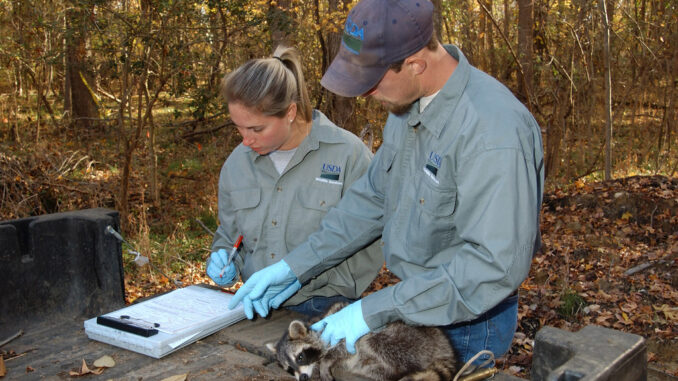
The question of whether raccoons are born with rabies sparks curiosity and concern among those sharing spaces with them. It’s essential to clarify that raccoons, like other animals, are not born with rabies. Rabies is a viral infection that animals contract through contact with infected saliva, and raccoons can acquire it later in life if exposed.
In this exploration, we debunk the misconception, emphasizing the importance of understanding the transmission of rabies and promoting accurate information about these adaptable urban dwellers.
Table of Contents
Do raccoons have rabies?
Raccoons can contract rabies, but it is a misconception to assume that all raccoons have the virus. Rabies is a viral disease that affects the nervous system of mammals, and raccoons are among the species susceptible to it. The transmission typically occurs through bites or scratches from an infected animal, such as another raccoon, bat, or fox.
What percentage of raccoons have rabies?
Estimating the exact percentage of raccoons with rabies is challenging because it varies across regions and depends on factors like population density and prevalence of the virus. However, the overall percentage of raccoons with rabies is relatively low.
According to wildlife experts and studies, the incidence of rabies in raccoon populations typically ranges from 1% to 5%. It’s important to note that not all raccoons carry the virus, and the majority of them are rabies-free.
Nonetheless, caution should always be exercised when dealing with wildlife to minimize the risk of disease transmission.
Are Raccoons Born with Rabies?
Raccoons are not born with rabies. Rabies is a viral disease that animals can contract later in life, typically through bites or scratches from infected animals. It’s essential to understand that not all raccoons carry the rabies virus, and encountering a raccoon does not automatically mean there is a risk of transmission.
Rabies is acquired during an animal’s lifetime, and while raccoons can be carriers, they do not pass the virus to their offspring.
Table: Facts About Raccoons and Rabies
| Myth | Fact |
| Raccoons are born with rabies. | Raccoons are not born with rabies; they may contract it later in life through exposure. |
| All raccoons have rabies. | Not all raccoons have rabies; it depends on their exposure to the virus. |
| Rabies is exclusive to raccoons. | Rabies can affect various animals and even humans. |
Symptoms of rabies in raccoons
Here is a list of symptoms of rabies in raccoons and how to tell if a raccoon has rabies:
- Aggression: Rabid raccoons may display uncharacteristic aggression, attacking without provocation.
- Disorientation: Infected raccoons may appear confused or disoriented in their movements.
- Excessive Drooling: Rabies affects the ability to swallow, leading to increased drooling in raccoons.
- Unusual Vocalizations: Raccoons with rabies may produce abnormal sounds, such as growls or screams. Read the full guide on what is the normal sound of the raccoon.
- Lack of Coordination: Infected raccoons may exhibit unsteady movements and lack of coordination.
- Paralysis: In later stages, rabies can lead to paralysis in raccoons.
- Foaming at the Mouth: One of the classic signs, rabid raccoons may foam at the mouth due to difficulty swallowing.
- Disregard for Humans or Other Animals: Infected raccoons may lose their fear of humans and other animals.
- Seizures: In advanced stages, raccoons with rabies may experience seizures.
It’s important to note that these symptoms do not guarantee rabies, and other diseases or conditions could cause similar behaviors.
How to prevent rabies transmission from raccoon
- Avoid Direct Contact: Refrain from approaching or handling raccoons to minimize the risk of disease transmission.
- Secure Trash Bins: Properly secure trash cans to discourage raccoons, reducing the likelihood of contact.
- Vaccinate Pets: Ensure pets, especially cats and dogs, are up-to-date on rabies vaccinations for their safety.
- Report Abnormal Behavior: If a raccoon exhibits unusual behavior, such as aggression or disorientation, report it to local animal control.
- Professional Handling: Leave the handling of potentially rabid raccoons to trained professionals to mitigate risks.
Frequently Asked Questions (FAQs) About Raccoons and Rabies
Q1: Do baby raccoons have rabies?
A1: Yes, baby raccoons can have rabies. While they are not born with the virus, they can contract rabies later in life through exposure to an infected animal. It’s important to exercise caution and avoid handling any raccoon, regardless of age, to minimize the risk of transmission.
Q2: How do raccoons get rabies?
A: Raccoons typically get rabies through bites or scratches from infected animals like other raccoons, bats, or foxes.
Q3: Do raccoons die from rabies?
A: Yes, raccoons can succumb to rabies. The virus affects the nervous system, leading to severe symptoms and, ultimately, death.
Q4: How long does a raccoon live with rabies?
A: The progression of rabies in raccoons varies, but once symptoms appear, the disease is often fatal within a few days to weeks.
Q5: Does a raccoon bite guarantee rabies?
A: Not every raccoon bite leads to rabies. However, if you have been bitten by raccoon, it should be taken seriously, and it’s crucial to seek medical attention promptly to assess the risk and receive appropriate treatment.
Conclusion:
Understanding the dynamics between raccoons and rabies is crucial for fostering safe coexistence. While baby raccoons are not born with rabies, they can acquire the virus later in life. Vigilance is essential when encountering these creatures, as rabies transmission occurs through bites or scratches from infected animals. Practicing preventive measures, such as avoiding direct contact, securing trash bins, and vaccinating pets, reduces the risk of transmission.
